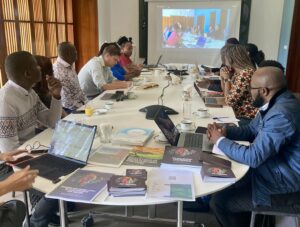Seminar und Pressekonferenz zu Gene Drives in Nairobi
Am heutigen Morgen, Freitag, den 17. Mai, veranstalteten Save Our Seeds in Zusammenarbeit mit Pollinis ein hybrides Seminar über gentechnisch veränderte Organismen (GMOs) und Gene Drives. Diese Veranstaltung bot eine außergewöhnliche Gelegenheit, Einblicke in die politische Landschaft rund um GMOs und das zunehmend umstrittene Thema der Gene Drives zu gewinnen, die derzeit auf der Konvention über die biologische Vielfalt der Vereinten Nationen diskutiert werden. Unsere Expert:innen, frisch aus den jüngsten SBSTTA-Diskussionen, beleuchteten, was während dieser entscheidenden Debatten geschehen ist und was dies für lokale Kontexte bedeutet.
Im Anschluss an das Seminar fand eine Pressekonferenz statt, an der Journalisten aus mehreren afrikanischen Ländern teilnahmen.
 Pressemitteilung (auf englisch)
Pressemitteilung (auf englisch)
UN Body Considers Risky New Genetic Technologies: Civil Society Urges Precaution
Nairobi, Kenya, May 17 2024: Parties to the United Nations Convention on Biological Diversity (CBD) are currently discussing controversial technologies in Nairobi. One such technology is engineered gene drives. It is a form of extreme genetic engineering which is designed to spread its modification throughout an entire species and persist in the environment. In Africa, gene drive projects, largely funded by the Bill and Melinda Gates Foundation, are already underway in several countries including Burkina Faso, Ghana, Uganda and most recently in Tanzania, aiming to eradicate malaria. However, these techno-fixes do not address the root causes of health challenges on the continent and pose novel risks. Furthermore, these projects are proceeding despite the absence of adequate local capacity to assess and regulate them effectively.
While gene drive lobbyists, at the 26th meeting of the Subsidiary Body on Scientific, Technical and Technological Advice (SBSTTA) to the CBD in Nairobi, use the possibility of malaria eradication to promote the technology, civil society organizations have found that most patents are being filed for agricultural use. Patents reference hundreds of agricultural uses, such as for herbicides, pesticides and so called “pests”. Researchers found that agribusiness firms such as Monsanto-Bayer and Cibus Bioscience were also engaging with gene drive development.
At this year’s SBSTTA meeting, member states are examining reports from expert groups, highlighting numerous risks and unanswered questions about gene drives. Discussions are particularly focused on the contrasting potential benefits and risks these technologies might pose. Sub-Saharan countries are advocating for enhanced capacity building, technology transfer, and some seem to be willing to adopt gene drives. African civil society organizations (CSOs) are calling for ongoing evaluations and a robust, updated regulatory framework to manage these technologies. They endorse a precautionary approach and support the establishment of an international expert group to review new technologies before they are introduced to the environment.
Decisions made at SBSTTA will be taken to the Conference of the Parties to the CBD in October 2024 to be further discussed, where heads of states will decide on how to proceed with these technologies.
Contacts:
Sabrina Masinjila
African Centre for Biodiversity
+255 767 089 834
Barbara Ntambirweki
ETC Group Uganda
bntamby@gmail.com
References:
Gene Drive Brochure
Forcing the Farm:

 Pressemitteilung (auf englisch)
Pressemitteilung (auf englisch)